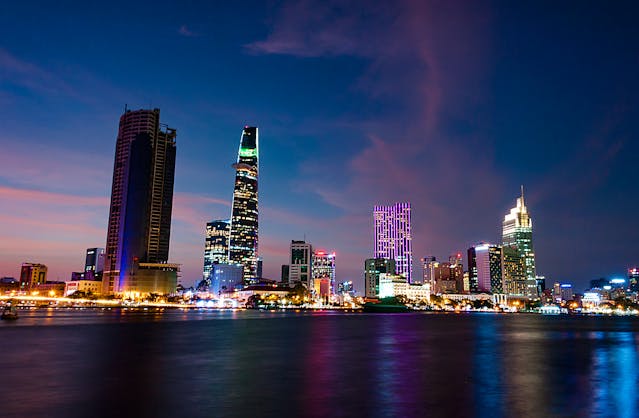Vietnam’s Circular Economy
Vietnam is increasingly embracing the concept of a circular economy as a strategic response to meet international commitments and the country’s sustainable development goals. This transition is supported by various government policies, innovative business models, and significant opportunities for foreign investment.
Quick information on Vietnam’s Circular Economy
- What is a circular economy?
- A circular economy is an alternative to a traditional linear economy, prioritising reusing materials through circulation and reducing waste
- To transition to a circular economy, there are several policies and programs being implemented by Vietnam’s government and companies
Vietnam’s Government Policies on Circular Economy
The Vietnamese government has established a robust framework to promote circular economy practices through several key policies:
- Decision 687/QD-TTg: Ratified in July 2022, this decision outlines the government’s commitment to transitioning towards a circular economy by 2030. The goal is to enhance urban solid waste collection and treatment rates to 50% and achieve 100% recycling of waste materials
- National Action Plan for Circular Economy (NAPCE): Currently being developed, NAPCE aims to create a coordinated approach for implementing circular economy practices across various sectors. The plan focuses on improving recycling rates and reducing waste generation.
- Law No. 72/2020/QH14 on Environmental Protection (2020): This law emphasises the importance of circular economy principles in Vietnam’s socio-economic development strategy for 2021-2030. It includes provisions for waste management and resource efficiency
- Decree No. 08/2022/NĐ-CP: Issued in January 2022, this decree identifies three key pillars for the circular economy: reducing resource exploitation, extending the lifespan of products, and minimising waste
These policies reflect Vietnam’s commitment to sustainable development, aligning with global trends and addressing local environmental issues.
Circular economy models adopted by companies in Vietnam
Companies are increasingly adopting circular economy models, demonstrating innovation and commitment to sustainability. Notable examples include:
- Heineken Vietnam: Heineken Vietnam has developed a comprehensive circular economy model that emphasises sustainable development across its operations.
- Sustainability Focus: Heineken’s strategy revolves around three pillars: prosperity, people, and the planet.
- Transformation from linear to circular model, involving using secondary materials during production and designing products for easier recycling.
- Waste utilisation: Beer residues are repurposed as animal feed, and treated wastewater is utilised for irrigation and aquaculture. Rice husks and sawdust are processed to create biomass fuel for energy needs in the plants.
- Recycling initiatives: The company actively collects packaging materials (cans, bottles, caps) from retailers for recycling and reuse.
- Employee engagement: Heineken promotes a culture of recycling among staff through different initiatives.
- Future goal: Heineken Vietnam will compensate 100% of water used in the production process, recycle 100% of waste generated, and use 100% renewable energy by 2025.
- Unilever Vietnam: Unilever Vietnam is actively pursuing a Circular Economy project aimed at fostering sustainability and addressing plastic waste management challenges.
- “Exchange Trash for Gifts” Program: This initiative encourages community participation in plastic waste collection.
- Public-Private Partnerships: Unilever collaborates with various stakeholders, including government bodies and private companies, to collect and recycle plastic waste for use in packaging production.
- Community engagement: Unilever educates the general public on proper waste management through media campaigns and works directly with scrap collectors to improve their livelihoods.
- Sustainable packaging goals: Unilever plans to collect and recycle an additional 30,000 tons of plastic waste from 2022 to 2027, further promoting a green economy.
- Eco-Industrial Parks: Several eco-industrial parks have been established in cities like Ninh Binh, Can Tho, and Da Nang.
- These parks facilitate resource sharing among businesses, leading to significant cost savings and reduced environmental impact.
- For instance, companies within these parks collaborate on waste management and recycling efforts.
Opportunities for foreign companies
The shift towards a circular economy presents numerous opportunities for foreign companies looking to invest in Vietnam, such as:
- Investment in recycling infrastructure: With Vietnam’s current low recycling rates, there is a significant demand for investment in recycling facilities and technologies. Foreign companies can play a crucial role by providing advanced recycling technologies and expertise.
- Participation in Eco-Industrial Parks: Foreign investors can engage in eco-industrial parks that promote collaboration among businesses focused on sustainability. These parks provide a conducive environment for implementing circular economy practices effectively
- Government support: The Vietnamese government is actively seeking foreign partnerships to achieve its circular economy goals. This includes favorable policies and incentives for companies that contribute to sustainable development initiatives.
Want to be a part of Vietnam’s circular economy?
GLOBAL ANGLE conducts market research in Vietnam for foreign companies looking for business opportunities in the country. We are able to provide resources such as our local Vietnamese partner, team members, as well as local researchers. These resources are able to conduct comprehensive on-the-ground market research and business consulting work. According to your specific business requirements, we are able to conduct customised market research. Take a look at our market research calculator to gauge the costs and timeline of your project.
Look into our previous work in Vietnam
-

Research on Premium Cosmetics and Skincare Market in Philippines and Vietnam
-

Research on Smart Home Appliance Market in Thailand and Vietnam
-

Research on Impact of Supply Chain Diversification in Smartphone manufacturing
-

Google Trend research on global tire manufacturers in 25 countries
-

Company Listing: Potential Capital Alliance Partner
-

In-Store Research: Supplement & Energy Drink Products
-

Store Visit: Retail Supermarket Brand Comparison on Air Freshener, Deodorizer, and Insect repellent
-

Beauty products receptivity study in Southeast Asia
-

Interview: Distribution Channel Structure for Electrical Materials in Asia
-

Site Visit: Research on Power Tools in Africa and Asia




